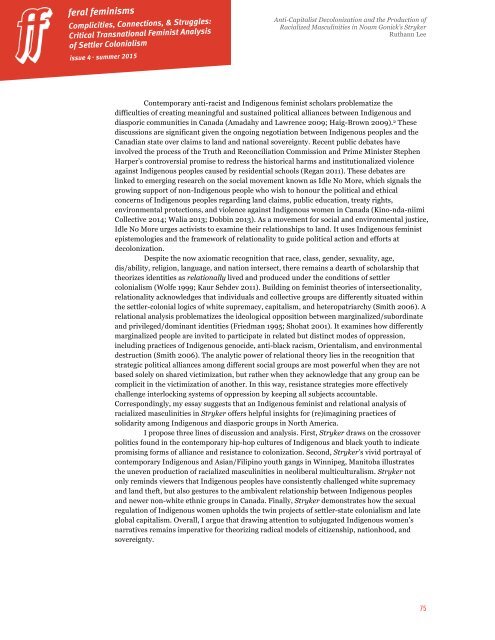feminisms
ff_issue4
ff_issue4
- No tags were found...
Create successful ePaper yourself
Turn your PDF publications into a flip-book with our unique Google optimized e-Paper software.
feral <strong>feminisms</strong>Complicities, Connections, & Struggles:Critical Transnational Feminist Analysisof Settler Colonialismissue 4 . summer 2015Anti-Capitalist Decolonization and the Production ofRacialized Masculinities in Noam Gonick’s StrykerRuthann LeeContemporary anti-racist and Indigenous feminist scholars problematize thedifficulties of creating meaningful and sustained political alliances between Indigenous anddiasporic communities in Canada (Amadahy and Lawrence 2009; Haig-Brown 2009). 2 Thesediscussions are significant given the ongoing negotiation between Indigenous peoples and theCanadian state over claims to land and national sovereignty. Recent public debates haveinvolved the process of the Truth and Reconciliation Commission and Prime Minister StephenHarper’s controversial promise to redress the historical harms and institutionalized violenceagainst Indigenous peoples caused by residential schools (Regan 2011). These debates arelinked to emerging research on the social movement known as Idle No More, which signals thegrowing support of non-Indigenous people who wish to honour the political and ethicalconcerns of Indigenous peoples regarding land claims, public education, treaty rights,environmental protections, and violence against Indigenous women in Canada (Kino-nda-niimiCollective 2014; Walia 2013; Dobbin 2013). As a movement for social and environmental justice,Idle No More urges activists to examine their relationships to land. It uses Indigenous feministepistemologies and the framework of relationality to guide political action and efforts atdecolonization.Despite the now axiomatic recognition that race, class, gender, sexuality, age,dis/ability, religion, language, and nation intersect, there remains a dearth of scholarship thattheorizes identities as relationally lived and produced under the conditions of settlercolonialism (Wolfe 1999; Kaur Sehdev 2011). Building on feminist theories of intersectionality,relationality acknowledges that individuals and collective groups are differently situated withinthe settler-colonial logics of white supremacy, capitalism, and heteropatriarchy (Smith 2006). Arelational analysis problematizes the ideological opposition between marginalized/subordinateand privileged/dominant identities (Friedman 1995; Shohat 2001). It examines how differentlymarginalized people are invited to participate in related but distinct modes of oppression,including practices of Indigenous genocide, anti-black racism, Orientalism, and environmentaldestruction (Smith 2006). The analytic power of relational theory lies in the recognition thatstrategic political alliances among different social groups are most powerful when they are notbased solely on shared victimization, but rather when they acknowledge that any group can becomplicit in the victimization of another. In this way, resistance strategies more effectivelychallenge interlocking systems of oppression by keeping all subjects accountable.Correspondingly, my essay suggests that an Indigenous feminist and relational analysis ofracialized masculinities in Stryker offers helpful insights for (re)imagining practices ofsolidarity among Indigenous and diasporic groups in North America.I propose three lines of discussion and analysis. First, Stryker draws on the crossoverpolitics found in the contemporary hip-hop cultures of Indigenous and black youth to indicatepromising forms of alliance and resistance to colonization. Second, Stryker’s vivid portrayal ofcontemporary Indigenous and Asian/Filipino youth gangs in Winnipeg, Manitoba illustratesthe uneven production of racialized masculinities in neoliberal multiculturalism. Stryker notonly reminds viewers that Indigenous peoples have consistently challenged white supremacyand land theft, but also gestures to the ambivalent relationship between Indigenous peoplesand newer non-white ethnic groups in Canada. Finally, Stryker demonstrates how the sexualregulation of Indigenous women upholds the twin projects of settler-state colonialism and lateglobal capitalism. Overall, I argue that drawing attention to subjugated Indigenous women’snarratives remains imperative for theorizing radical models of citizenship, nationhood, andsovereignty.75


